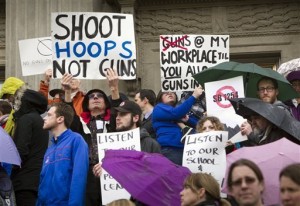The New York Times Op-Ed titled “When May I Shoot a Student?” is an excellent example of the hyperbole and misinformation present whenever opponents of self-defense choose to ridicule the campus carry movement rather than have a meaningful discussion.
The simple fact of the matter is that the current “gun-free zone” policies fail time and time again to prevent violent crime on campus, and the predictions of shootouts in the streets are the same ones that have not materialized elsewhere as the right to self-defense has been strengthened by “shall-issue” laws and the removal of concealed carry prohibitions.
The crumbling foundation of the argument in “When May I Shoot a Student?” is based on the false notion that concealed carry on campus would change who is eligible to carry a concealed firearm, and that all people on campus are “drunken frat boys.” The first statement is patently untrue, and the second is an ignorant and insulting stereotype.
As written, Idaho Senate Bill 1254 addresses multiple issues with regards to concealed carry. First, it restates the prohibition on carrying a firearm on or about the person while under the influence of an intoxicating drink or drug. It also adds to that section a penalty revoking the concealed carry license for a period of three years should that violation occur on a college campus.
The second part of the bill redefines the authority of administrations of public universities to rules and regulations pertaining to firearms, except for regulating or prohibiting the otherwise lawful possession of a firearm by someone licensed by the state. Concealed carry licensees would still be prohibited from carrying their firearm in campus housing or public entertainment facilities including stadiums and arenas.
Finally, the bill establishes civil immunity for the administrations of universities for suits arising out of policies to allow or not specifically prohibit the lawful possession and storage of firearms on their properties.
The people who would subsequently be allowed to lawfully carry on campus are the same ones that carry at the movie theater, grocery store and restaurant across the street from campus right now. They are over 21, and have been trained, fingerprinted and background checked by the state. The notion that these same adults, if allowed to cross an invisible property line onto campus, would suddenly become reckless and dangerous is frankly absurd.
Another telling statement made by the author is he has “had encounters with disgruntled students over the years, some of whom seemed quite upset, but [he] always assumed that when they reached into their backpacks they were going for a pencil.” This falls under the myth that somehow a sign and a policy would keep someone intent on committing a violent crime from bringing an illegal firearm into the classroom.
“In terms of the campus murder rate — zero at present — I think that we can all agree that guns don’t kill people, people with guns do.” This argument, that a place is too safe to allow people to take responsibility for their own self-defense, also seems fundamentally flawed. How dangerous would an area have to be before self-defense is allowed? How about the three forcible rapes and three aggravated assaults reported by Boise State University in 2012? Or does it have to be as severe as the 32 people killed and 17 injured in the “gun-free zone” at Virginia Tech in 2007?
While the author presents his (hopefully) facetious examples how he would recklessly respond to incidents on campus if lawful concealed carry were allowed, projecting his lack of self-control and understanding of lawful use of force onto all licensed adults is uncalled for. These adults have been declared mature enough to incur tens of thousands of dollars in student loans, choose the next President of the United States, and yes, even enlist in the military or police force to protect him. Who is he to declare that they should not be allowed to defend themselves from threats that clearly exist on college campuses?
As the list of places where campus carry prohibitions are lifted continues to grow, we still have yet to see the doom and gloom scenarios of opponents materialize, and often violent crime even decreases. If there is no evidence that concealed carry makes campuses more dangerous, and the possibility exists that they could become safer, shouldn’t legislators and administrators err on the side of letting students, faculty and the public retain their right to self-defense?





